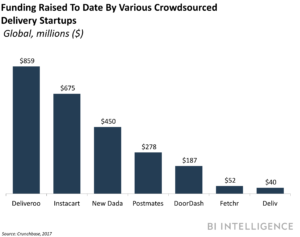As the steady rise of e-commerce pushes logistics companies and their retail partners to deliver more parcels, faster, speedy delivery is becoming a major competitive advantage. And no company has capitalized on this opening like Amazon, which has made a name for itself in fulfillment with its Prime and Prime Now delivery offerings.
Now, Amazon’s retail competitors and their logistics partners are exploring new models and technologies in a race to meet consumers’ growing demand for faster delivery. Crowdsourced delivery is one model gaining popularity it leverages local, nonprofessional couriers to get packages to customers’ doors, sometimes in less than an hour. This model allows companies to satisfy consumers’ growing demand for faster online deliveries.
Crowdsourced delivery startups, like Postmates, Instacart, and Deliv, have sprung up around the world, and have collectively attracted several billion dollars in investment. In a new report, BI Intelligence examines the rise of the crowdsourcing model in the last-mile delivery space, which is becoming a crucial segment of the logistics industry with the growth of e-commerce.
Some key findings:
- Crowdsourcing can drastically speed up deliveries in urban areas, where there is a high density of deliveries and potential couriers to be matched.
- However, as delivery volumes increase, crowdsourced delivery startups will need to further optimize their deliveries to improve cost efficiencies.
- Many of the deliveries these startups perform today will likely be automated in the future, raising the possibility that these startups may eventually look to incorporate new technologies like delivery drones or self-driving delivery vehicles.

